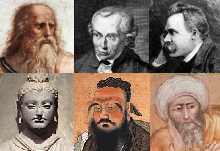Philosophy:Animalism
This article is missing information about the philosophical theory of animalism. (July 2018) |
| Part of a series on |
| Philosophy |
|---|
 |
| Philosophers |
| Periods |
| Branches |
In the philosophical subdiscipline of ontology, animalism is a theory of personal identity that asserts that humans are animals.[1] The concept of animalism is advocated by philosophers Eric T. Olson, Peter Van Inwagen, Paul Snowdon, Stephan Blatti, David Hershenov and David Wiggins.({{{1}}}, {{{2}}})[page needed] The view stands in contrast to positions such as John Locke's psychological criterion for personal identity or various forms of mind–body dualism, such as Richard Swinburne's account.
Thinking-animal argument
A common argument for animalism is known as the thinking-animal argument. It asserts the following:[2]
- A person that occupies a given space also has a Homo sapiens animal occupying the same space.
- The Homo sapiens animal is thinking.
- The person occupying the space is thinking.
- Therefore, a human person is also a human animal.
Use of term in ethics
A less common, but perhaps increasing, use of the term animalism is to refer to the ethical view that all or most animals are worthy of moral consideration.[3] It may be similar, though not necessarily, to sentientism.
References
Footnotes
- ↑ Olson 2007, sec. 2.1.
- ↑ Olson, Eric (2003). "An Argument for Animalism". Personal Identity: 318–34. https://www.sheffield.ac.uk/polopoly_fs/1.101685!/file/animalism.pdf.
- ↑ The Animalist. "What Is Animalism?". https://medium.com/@TheAnimalist/what-is-animalism-dc1bb9f9f822.
Bibliography
- Blatti, Stephan; Snowdon, Paul, eds (2016). Animalism: New Essays on Persons, Animals, & Identity. Oxford University Press.
- Garrett, Brian (1998). Personal Identity and Self-Consciousness. London: Routledge. ISBN 978-0-415-16573-0.
- Olson, Eric T. (2007). What Are We? A Study in Personal Ontology. Oxford University Press.
- Snowdon, Paul (2017). Persons, Animals, Ourselves. Oxford University Press.
Further reading
- Baker, Lynne Rudder (2005). "When Does a Person Begin?". in Paul, Ellen Frankel; Miller, Fred D., Jr.; Paul, Jeffrey. Personal Identity. Cambridge, England: Cambridge University Press. pp. 25–48. doi:10.1017/CBO9780511759345.003. ISBN 978-0-511-75934-5.
- Blatti, Stephan (2020). "Animalism". in Zalta, Edward N.. The Stanford Encyclopedia of Philosophy (Fall 2020 ed.). Stanford, California: Stanford University. https://plato.stanford.edu/archives/fall2020/entries/animalism/. Retrieved 30 November 2020.
